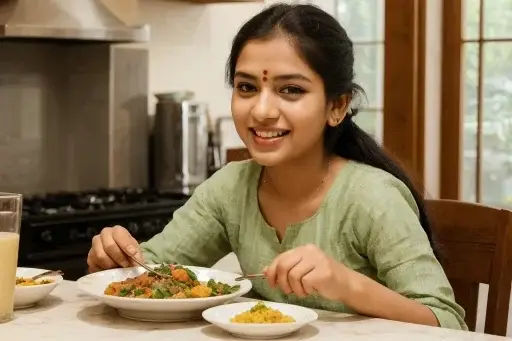Wellhealthorganic.com: Ayurveda Dinner
Wellhealthorganic.com Welcomes you to read about Ayurveda Dinner.
Wellhealth Ayurvedic health tips are research-proven Ayurveda advises eating these healthy foods for dinner to stay healthy.
Table of Contents
- Ayurvedic Principles For Dinner
- Eat Light
- Eat Well Cooked Food
- Ayurvedic Dinner Ideas
- Vata-Balancing Stew
- Pitta-Pacifying Khichdi
- Kapha-Invigorating Barley Soup
- Tri-Dosha Balancing Quinoa Pilaf
- FAQs:
- References:
The most calming yet profoundly transformative approach to diet and lifestyle is provided by Ayurveda, which can easily be adapted for well-being and healthy living in these times when processed foods and modern fads in dietetics have overtaken tradition. Wellhealthorganic.com Ayurveda Dinner : 10+ Wellhealth Ayurvedic Health Tips
Ayurveda prescribes not a mere list of food items, rather it prescribes a way of eating and living in harmony with the inside and outside factors around the body.
Ending the day with an Ayurveda dinner could just be the perfect way to feed the body, calm the mind, and set the stage for a good night’s rest. Wellhealthorganic.com Ayurveda Dinner : 10+ Wellhealth Ayurvedic Health Tips
Let’s consider Ayurveda principles and turn to some dinner ideas that promise to do much more than just titillate your taste buds; these will restore your balance and health.
It is a well-known proverb among physicians and dietitians, “breakfast is the most important meal of the day.” It’s your first meal of the day after a gap of 6-8 hours since dinner, hence should not be missed.
However, the other meals, like lunch and dinner, are also equally important and should not be missed.
Giving up your lunch and dinner will not help you lose weight, as is commonly believed.
Ayurvedic Principles For Dinner
1. Eat Light and Easy to Digest Dinner:
According to Ayurveda, our digestive fire, or Agni, is less strong in the evening. Hence, dinners should be lighter compared to lunch, ensuring they can be easily digested before bedtime. This aids in promoting a good night’s sleep and overall well-being.
2. Eat Well Cooked and Warm Dinner
Ayurveda recommends warm, cooked food in the evening to appease the digestive system and promote maximal nutrient absorption
3. Dosha Balancing:
Knowing your dominant dosha and choosing the right kind of food can therefore be a great key to keeping good health. For example, Vata does much better with grounding, moist, and warming foods. Pitta does much better with cooling and calming meals, and Kapha with light, exciting dishes. Wellhealthorganic.com Ayurveda Dinner : 10+ Wellhealth Ayurvedic Health Tips
Read Our Other Related Posts: Easy Wellhealth Tips To Improve Digestive System
Ayurvedic Dinner Ideas
1. Vata-Balancing Stew:
Enjoy a nutritious stewed root vegetable dinner, such as sweet potatoes, carrots, and beets, together with the mung beans and warming spices (for example, ginger and cumin). Take all these, grounding and moist—perfect to counter the dry and light qualities of Vata. Wellhealthorganic.com Ayurveda Dinner : 10+ Wellhealth Ayurvedic Health Tips
2. Pitta-Pacifying Khichdi:
Khichdi is a traditional Indian food made from rice and lentils. It pacifies Pitta. The best way to prepare it is to add cooling spices like fennel and coriander, along with vegetables such as zucchini and kale to it, to make it wholesome and light for the digestive system. Wellhealthorganic.com Ayurveda Dinner : 10+ Wellhealth Ayurvedic Health Tips
3. Kapha-Invigorating Barley Soup:
With green vegetables like spinach and some interesting spices like black pepper and turmeric, barley soup is served in a light vegetable broth, can be good for Kapha without overburdening the system.
4. Tri-Dosha Balancing Quinoa Pilaf:
A quinoa pilaf, when combined with seasoned veggies like carrots, peas, and asparagus, mixed with mild spices like turmeric and coriander, and topped with a squeeze of fresh lime juice, would be excellent for balancing the three doshas, making it suitable for a family with a variety of body types.
Start Today: Ayurvedic Dinners for Holistic Health:
Applying Ayurvedic principles to your dinner is a simple way to take exquisite care of your body and your mind. If you consider the ingredients and recipes suitable for your dosha and the natural rhythm of your body, your overall welfare will easily be taken care of. Wellhealthorganic.com Ayurveda Dinner : 10+ Wellhealth Ayurvedic Health Tips
Summary
From the Ayurvedic perspective, dinner offers more than the mere act of eating. It is a chance to nourish more than the body: it is the opportunity to feed the soul with meals that allow people to reflect on the balanced nature of the universe.
Incorporating these timeless principles in our daily lives allows us to gain entrance to residing in a more wholesome and balanced existence. Let’s look at our dinner hour as part of a healing, relaxing, and rejuvenating opportunity.
FAQs:
1. Can Ayurvedic dinners help with weight loss?
Yes, Ayurvedic dinners can promote healthy weight management since they have a strong emphasis on digestion and dosha balance. Better metabolism and less overeating can be achieved with lighter, well-seasoned meals. Wellhealthorganic.com Ayurveda Dinner : 10+ Wellhealth Ayurvedic Health Tips
2. How do I know my dosha?
Your dosha can be determined by consulting with an Ayurvedic practitioner or by taking online quizzes from reputable sources. Knowing your dosha can guide you in choosing the most beneficial foods for your constitution.
3. Are raw foods ever recommended in Ayurveda?
While Ayurveda generally recommends cooked foods for better digestibility, raw foods can be suitable in moderation during the hot summer months, particularly for Pitta types. Wellhealthorganic.com Ayurveda Dinner : 10+ Wellhealth Ayurvedic Health Tips
References:
- Lad, V. (1998). “The Complete Book of Ayurvedic Home Remedies.” A comprehensive guide that offers insights into Ayurvedic principles and practical advice for incorporating them into your life.
- Sharma, H., & Chandola, H.M. (2011). “Principles of Ayurveda.” Ancient Science of Life. This paper delves into the foundational concepts of Ayurveda, including the significance of dosha balance in maintaining health.
- Sharma, H., Chandola, H. M., Singh, G., & Basisht, G. (2007). Utilization of Ayurveda in health care: an approach for prevention, health promotion, and treatment of disease. Part 2–Ayurveda in primary health care. Journal of alternative and complementary medicine (New York, N.Y.), 13(10), 1135–1150. https://doi.org/10.1089/acm.2007.7017-B
As we explore the wisdom of Ayurveda through our dinners, remember that the journey to wellness is personal and unique. Be patient, experiment, and consult with Ayurvedic professionals to tailor these principles to your life seamlessly.

